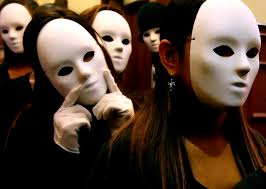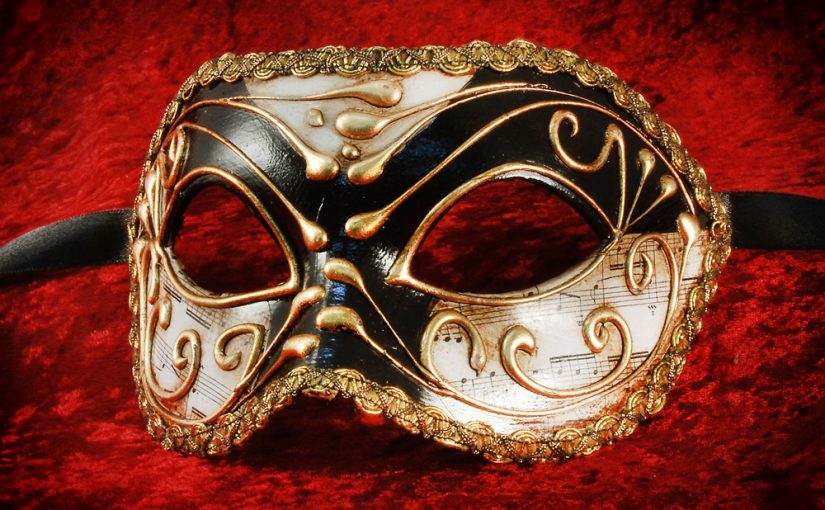Anne Brontë was a naturally shy woman who kept her feelings hidden whenever possible, and this reserve also extended to lesser and greater degrees throughout her siblings. Their father Patrick was well aware of this, and developed an idea that would help him find out what his children were really like, and what they thought. To unmask his children, he would put them behind a mask.
We have no idea what kind of mask Patrick had in the Parsonage, could it have been a Pierrot style mask, white and neutral, or even a large tribal style mask that would have fascinated his exploration loving youngsters? Whatever mask it was, Patrick lined his children up and made them wear it one after the other as he asked them a single question that would get to the heart of their character. The answers are very revealing, so we’ll look at each one in turn. Here is how Patrick Brontë explained the event:
“When my children were very young, when as far as I can remember, the oldest was about ten years of age, and the youngest about four, thinking that they knew more than I had yet discovered, in order to make them speak with less timidity, I deemed that if they were put under a sort of cover I might gain my end; and happening to have a mask in the house, I told them all to stand and speak boldly from under the cover of the mask.

I began with the youngest (Anne, afterwards Acton Bell) and asked what a child like her most wanted; she answered, ‘Age and experience'”
So Patrick started with the child of most interest to us, Anne Brontë herself. Was this because she was the most timid, or simply because she was the youngest? Her answer is both moving and illuminating. For a four year old girl she is wise and eloquent beyond her years. She doesn’t want a doll or to live in a fairytale castle, although we know she did love both these things; no, what she wanted were the two things she was fated never to have – age and experience.
“I asked the next (Emily, afterwards Ellis Bell) what I had best do with her brother Branwell, who was sometimes a naughty boy; she answered, ‘Reason with him, and when he won’t listen to reason, whip him'”
In Emily as a five or six year old child, we see Emily as an adult. Reason is all very good in its own place, but sometimes actions speak louder than words. She wouldn’t shy away from the harshness and cruelty of life.
“I asked Branwell what was the best way of knowing the difference between the intellects of men and women; he answered, ‘By considering the difference between them as to their bodies’.”
We can already see that Branwell was already a sometimes strong willed and troublesome child from Emily’s question and answer. We now hear him flippantly dismissing his sisters as being somehow less than him simply because they weren’t male, his arrogance and pride coming to the fore as it would with devastating effect years later.
“I then asked Charlotte what was the best book in the world; she answered, ‘The Bible’. And what was the next best; she answered, ‘The Book of Nature’.”
From this, we see that even at age seven or eight, Charlotte Brontë loved nothing more than reading books – which is why her father asked her which was her favourite. He may have been surprised by her answers though, which show that she loved her faith and the rugged yet wonderful countryside around the Parsonage even more than the books within it.
“I then asked the next what was the best mode of education for a woman; she answered, ‘That which would make her rule her house well'”
This is the oft overlooked second sister, Elizabeth Brontë. The straightforward, practical member of the family looking forward to a traditional life of domesticity that she would never know.
“Lastly, I asked the oldest what was the best mode of spending time; she answered, ‘By laying it out in preparation for a happy eternity'”
This is the most moving answer of them all. Maria Brontë, brilliant child genius who by this age of ten could already converse with her father on all the subjects of the day. Within two years of putting on the mask she would be called to her eternity by tuberculosis.
Patrick gained a lot from putting the Brontë sisters and their brother behind the mask, but we can also see a premonition of another kind. Timid in real life, Anne, Charlotte and Emily Brontë found that they could be bold, truthful and creative when hidden behind a mask of anonymity. It’s something they would do again little more than twenty years later, when they took upon themselves the masks of Currer, Ellis and Acton Bell.

I then asked Charlotte what was the best book in the world; she answered, ‘The Bible’. And what was the next best; she answered, ‘The Book of Nature’.”
Remarkable as these two worthies proved to be vitally important to Charlotte’s writing later. Indeed , CB is taken to task by how easily and often she quotes the Bible ” as if it were Shakespeare ” by one reviewer